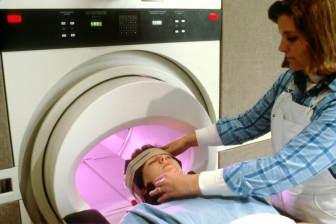Fruquintinib as a lung cancer treatment: Are we there yet?
Last updated: 13 March 2024

You can legally access new medicines, even if they are not approved in your country.
Learn howFruzaqla (fruquintinib) has been approved by the FDA to treat advanced colorectal cancer without a specific biomarker, following years of clinical use in China 1.
Similar to other targeted therapies approved recently (e.g. Enhertu, Keytruda and Jemperli), fruquintinib is also being studied for its potential application in treating other types of cancer. One of them is non-small cell lung cancer (NSCLC).
Here's everything there is to know about ongoing research, expected approvals, and early access options for fruquintinib as a lung cancer treatment.
What type of cancer does fruquintinib treat?
Fruzaqla (fruquintinib) is a targeted therapy. It selectively inhibits the VEGFR-1, -2 and -3 receptors, which play a role in tumor angiogenesis. In this way, fruquintinib aims to block tumors from getting the blood supply they need to grow.
Currently, fruquintinib is indicated for treating patients with metastatic colorectal cancer. Specifically, those who have been previously treated with chemotherapy, an anti-VEGF therapy, and an anti-EGFR therapy (if applicable) 2.
However, VEGF receptors play a role in other types of cancers as well 3. After all, all solid tumors need a blood supply to grow. That's also the reason why fruquintinib is being studied for its potential application in treating other types of cancer. Including breast cancer and lung cancer.
How effective is fruquintinib for lung cancer?
Several clinical trials involving fruquintinib in the treatment of NSCLC have been completed in recent years, mostly within China.
Based on the available reports, below are some notable outcomes.
Fruquintinib with gefitinib in EGFR-mutated advanced NSCLC
In this Phase II study, fruquintinib was used together with gefitinib as a first-line therapy in EGFR-mutated advanced NSCLC. These were some of the reported outcomes:
- 73.5% of patients treated with fruquintinib and gefitinib experienced a reduction in their tumor size;
- Median progression-free survival was 14.7 months, both for the placebo and the treatment group;
- 65.3% of patients experienced adverse effects of grade 3 or up 4.
Fruquintinib with sintilimab and chemotherapy in advanced NSCLC
In this Phase II study, fruquintinib was used with sintilimab and chemotherapy as a first-line therapy in advanced naive EGFR- and ALK-negative non-squamous NSCLC. Below are some result highlights:
- 80% of patients in the treatment group experienced a reduction in their tumor size;
- Median progression-free survival was not reached yet at time of reporting;
- 10% of patients in the treatment group experienced adverse effects of grade 3 or up 5.
Fruquintinib versus placebo in advanced NSCLC
In the Phase III FALUCA trial, fruquintinib alone was used versus placebo in advanced NSCLC patients. These are some of the reported results:
- Overall survival was 8.94 months for the fruquintinib group and 10.38 months for the placebo group;
- Median progression-free survival was 3.86 months for the fruquintinib group, versus 0.99 months for placebo;
- 13.8% of patients treated with fruquintinib had their tumor shrink, compared to 0.6% of the placebo group;
- There was an indication that the overall survival of fruquintinib patients who received no subsequent systemic anti-tumor therapies was higher than that of patients who did (7 months vs 5.06 months) 6.
Overall, fruquintinib shows mixed results in trials. It hasn't demonstrated a consistent beneficial effect on overall survival as a single agent yet. In combination with other treatments, it has shown positive results in terms of overall response rate. However, more studies are needed before fruquintinib is able to convince the FDA and other regulators that it can play a role in treating non-small cell lung cancer.
When will fruquintinib be approved for lung cancer?
Currently, fruquintinib has not been submitted anywhere for approval as a lung cancer treatment. However, there are multiple clinical trials involving fruquintinib as a single agent or in combination with other treatments for various types of NSCLC.
Based on their outcomes, we'll know more about Fruzaqla(fruquintinib)'s potential future role in lung cancer treatment.
Can my doctor prescribe fruquintinib for lung cancer?
Technically, they can. However, it's unlikely.
Fruquintinib has not yet been approved anywhere for the treatment of NSCLC. And while your doctor has the authority to prescribe it to you for that indication anyway (known as off-label prescription), they probably won't. The clinical trials involving fruquintinib in NSCLC treatment are not yet convincing enough for that.
If you and your doctor are looking for new NSCLC treatment options, some of the latest approvals to consider are:
- Enhertu: for lung cancer with the HER2 mutation;
- Lumakras: for lung cancer with the KRAS G12C mutation;
- Jemperli: Although not yet approved for use in NSCLC treatment, it's showing some positive clinical trial results.
Has your doctor prescribed a medicine that isn't (yet) approved or available in your country? Our team at Everyone.org can help you access it, based on the Individual Named Patient Import regulation. To get started, have your prescription ready and get in touch with us.
References:
- FDA Approval of Fruquintinib Expands Later-Line Treatment Options in mCRC. OncLive, 17 November 2023.
- Reference ID: 5275059. Accessdata.fda.gov, Accessed 6 December 2023.
- Angiogenesis Inhibitors - NCI. National Cancer Institute, 2 April 2018.
- Fruquintinib with gefitinib as first-line therapy in patients carrying EGFR mutations with advanced non-small cell lung cancer: a single-arm, phase II study. Translational Lung Cancer Research, Accessed 6 December 2023.
- Fruquintinib combined with sintilimab and chemotherapy as the first-line treatment in advanced naive EGFR- and ALK-negative non-squamous non-small cell lung cancer(nsq-NSCLC): Updated results of a phase II trial. Annals of Oncology,, October 2023.




